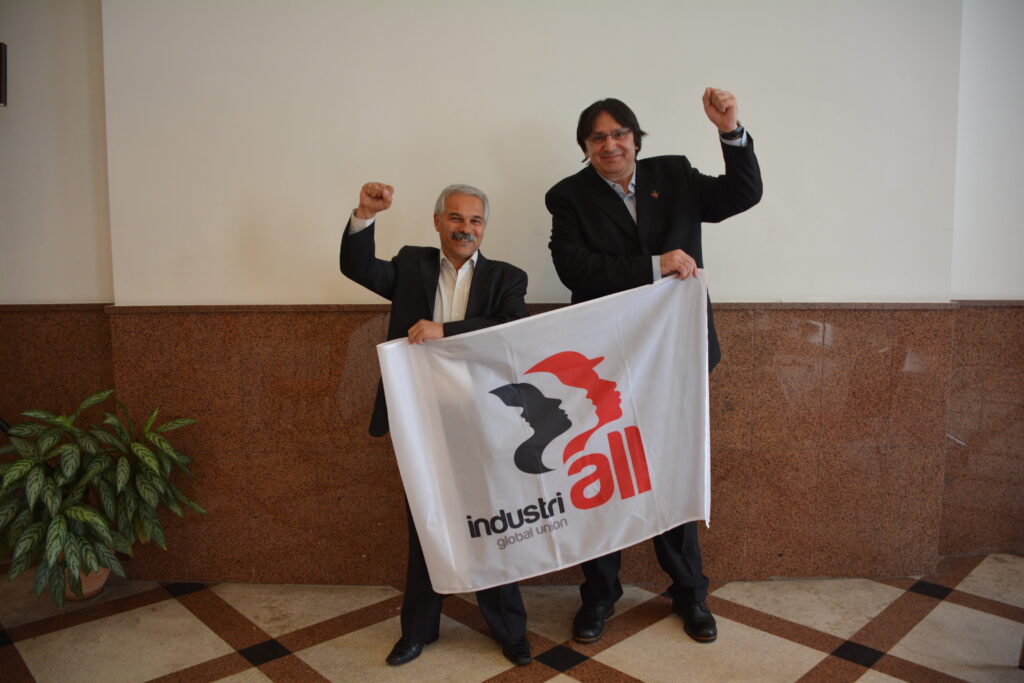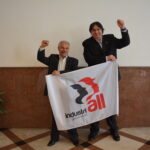Read this article in:
English
26 February, 2018Kemal Özkan of IndustriALL interviews Maziyar Gilaninejhad, president of the Union of Metalworkers and Mechanics of Iran in Yerevan, October 2017
Q1. Introduction by Kemal Özkan (KO) regarding UMMI and its affiliation to IndustriALL.
Would Maziyar Gilaninejhad (MG) explain how independent trade unions are trying to operate under difficult circumstances in Iran… Can you please tell us about your union? Whom do you represent? Information about your organization etc.
MG: In our country, Article 26 of the Constitution enshrines the right of workers' organizations, trade unions and political organizations to form and recruit members and clearly states that nobody should interfere with their activities – as has been articulated in ILO Conventions 87 and 98 – but unfortunately this has not been observed or respected and the trade unions in Iran are put under extremely heavy pressure should they try to engage in any meaningful activities.
And this is not only the case regarding UMMI – all our brother independent trade unions in Iran, including Sherkat-e Vahed (Bus Workers' Union), Haft Tappeh Syndicate (Sugar Cane Mill/Plant Workers) and the Syndicate of the Project and Contract Workers are all facing the same issues and, occasionally, the leaders and activists of these trade unions are arrested and imprisoned.
At present, Reza Shahabi is in prison and it was only two days ago that he ended the hunger strike he commenced in protest at his imprisonment – unfortunately, his health has been completely neglected by the authorities and there were real concerns for his life had he continued [with his hunger strike].
Also, the president of the Free Trade Unions of Iran, Jafar Azimzadeh, has been recently recalled to prison. He is not in a very good condition health-wise either and if he is forced to go back to prison then his physical health will certainly deteriorate and his life will be in danger.
These are the conditions under which we work in Iran. We are prevented from operating offices or holding bank accounts for the trade unions. In Iran, the regime does not allow us to have legal gatherings and prevent the likes of me, Reza Shahabi, Ebrahim Madadi, Davoud Razavi and Nasser Aghajari – as they don't accept that we are legitimate workers' representatives – from representing our trade unions and under no circumstances will they enter into any negotiations with us whatsoever.
As a result of these limitations, those workers who would like to get involved with their trade union and become active members are forced to think again and they look at trade union activities with some concern and doubt. We have been attacked on numerous occasions. For example, in 2009, in an attack on the meeting of a cooperative for consumer goods run by the UMMI, 15 people were arrested. And, towards the end of that same year, we again witnessed some arrests and then again more recently.
These arrests cause those workers who are thinking of becoming involved to become hesitant in taking the next steps to join the union and become active. As a result, we often have difficulty in recruiting members officially. We face many difficulties in organizing open activities.
Of course, there are certain officials in the government and judiciary that try a softer line in relation to us. However, the limitations are just too extensive. For example, if we write letters to the Ministry of Labour or Parliament in respect of some of our issues, we'll receive replies but these are insubstantial and never reflect the provisions of ILO Conventions 87 and 98 – they do not even satisfy the spirit of Articles 26 or 27 of the current Constitution of our country. And, as a result, this means that our outward impact and visibility in society is limited.
KO: What does the affiliation to IndustriALL mean for you? What are your expectations? What do you need exactly? What can we do to support your democratic union activities in the country?
MG: Firstly, I am so grateful to IndustriALL who wrote a letter to Dr. Hassan Rouhani, the Iranian President, and asked him to consider the situation of Reza Shahabi and other trade union and political prisoners – and I thank you for this.
This international solidarity; the fact that we can come to Yerevan and attend meetings with you; the fact that you ask me about our situation, this gives us strength. It strengthens our heart and resolve and gives confidence to us and our workers. They now realise that their brothers on the international scene have not abandoned them and are standing by them.
Our membership of IndustriALL has meant that we are working harder, more energetically, because we now know that we can channel our complaints to the ILO via IndustriALL in relation to the violation of laws and workers rights and that our issues will be brought to international attention and be raised at that level.
The fact is that the issues that Iranian workers confront are not so different from those faced by workers in, for example; Sweden, Turkey, Pakistan and Germany – they are often the same – the forces of capitalism are attacking our achievements, trying to destroy them and reverse the situation, essentially take us back.
For example, in Iran, they want to raise the retirement age to 65, they want to limit national insurance cover and social security, they want to increase the length of the working week at the same time as reducing salaries and wages – they are, in effect, trying to ensure that neo-liberalism governs every aspect of life and the working conditions in Iran just as elsewhere in the world.
At the moment, in our country, in the oil and gas industry, some workers receive their salaries up to six months in arrears! There are a lot of protests against this practice though unfortunately nobody seems to be paying any attention. We are planning to write a letter to the Iranian Parliament and to raise the importance of them passing a law which prohibits this delayed payment of salaries. This law that we request should penalize those employers that do not pay their workers on time so that the very minimum expectation amongst workers that their salaries will be paid and that they can provide food for their families can be realized and not put on hold for six months.
I can't understand how those who don't pay their workers salaries for six months … how do they live? Would they be able to carry on if they didn't receive their salaries for even two months while they expect their workers to accept not receiving their own wages for six months and to continue to work without protest?
In the oil industry, those project workers who represent their fellow workers on these issues or protest are subsequently blacklisted and will never be able to work in that industry again. And, this is a very blatant cruelty perpetrated towards a worker who is limited to working in that industry.
Work is not abundant and there is high unemployment. And they – the government and employers – use the existence of this army of the unemployed as a weapon against those working – not only in Iran but across the world – in order to undermine wages and lower conditions of service.
Unfortunately, we are faced with these problems. The fact that we are able to raise this; to tell our friends in IndustriALL; the fact that our Swedish friends, before they came to Iran, stated their solidarity with and support for us – this gives us strength. When they come to Iran, we ask them to raise the issues of the Iranian peoples' rights within the European Union. We asked our Swedish friends that in their own country and in the European Union they try and raise the issue of the lifting sanctions in respect of food and medical items and supplies – because the sanctions are an instrument of war against the Iranian working class. And, we demand this.
When this happens, when our Swedish brothers do this, it strengthens us and warms our heart. In addition, we – in these brotherly relations with IndustriALL – would be able to benefit from the facilities of IndustriALL, such as training and education facilities.
So, our workers can come and receive training and become familiar with the viewpoints of our brothers in IG Metall, our brothers in Sweden, Yerevan or elsewhere, and see what they think, what problems they have, what plans and programmes they envision – this provides the opportunity for us to learn from you and also for you to realize what conditions we are contending with in Iran.

